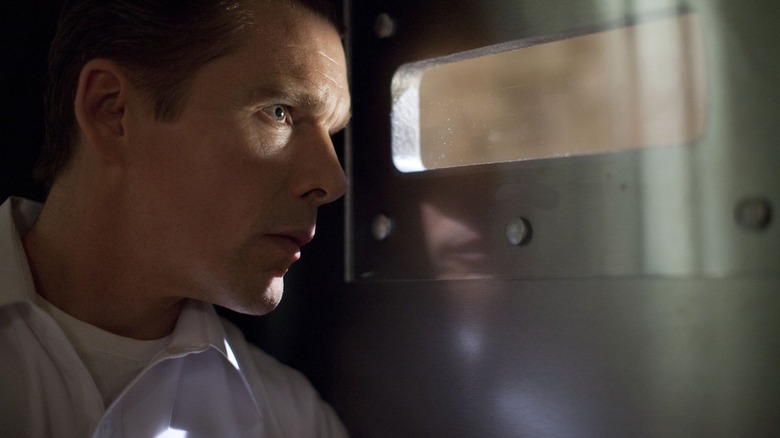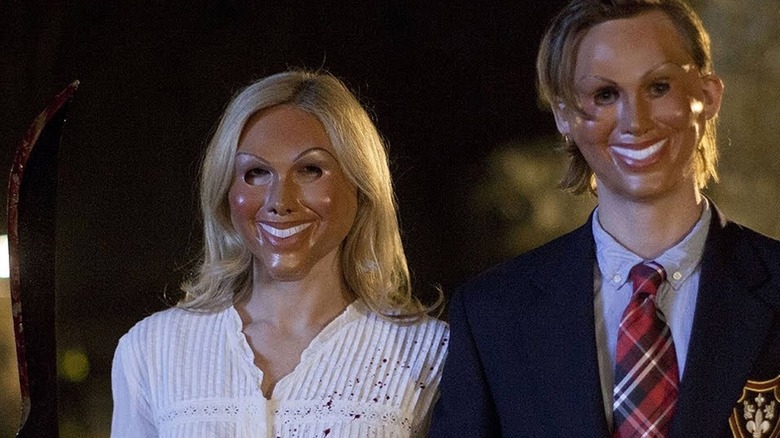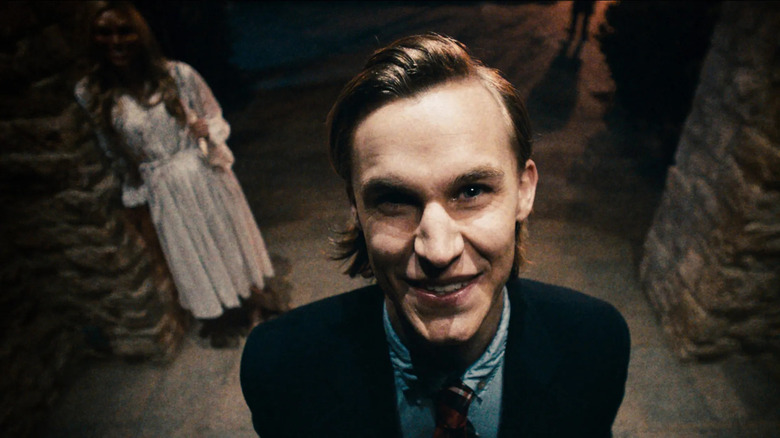The Horrors Of The Purge Became Too Real For The Director To Handle
In James DeMonaco's 2013 dystopian horror movie "The Purge," Ethan Hawke plays a wealthy seller of high-tech home security systems. He lives in a bourgeois neighborhood and all his rich neighbors have outfitted their homes with Hawke's wares. They plan on employing their security soon, as tonight is Purge Night. In the future of "The Purge," one night a year is designated to be law-free. American citizens are legally permitted to commit whatever wanton acts of assault, destruction, and murder they want, from sundown to sunrise. Having purged their hostility, the idea is that they'll go back to being upstanding citizens in the morning.
The premise is tantalizing, although the 2013 original takes place mostly inside the Hawke character's home, turning a fun idea into a pretty rote home invasion thriller. The film was made for a scant $3 million but would earn over $91 million, making it a runaway hit. To date, there have been four sequels to "The Purge," and a TV series. I personally recommend "The Purge: Election Year" from 2016. It most directly references the class-based political underpinnings baked into the premise. Note that the wealthy can afford to protect themselves in "The Purge." Do you think the impoverished have that same protection?
DeMonaco wrote and directed the first three "Purge" movies, but stepped away from directing for the fourth and fifth, and also for the TV series. In 2018, when the show premiered, the Los Angeles Times talked to DeMonaco about the phenomenon of "The Purge," and why it had made such an impact. He also revealed that he had to give up directing the "Purge" movies because they were becoming too real.
The Purge is too real
In 2013, the Purge was an intellectual exercise. DeMonaco recalled a chilling moment while driving with his wife that inspired his screenplay. Evidently, something startling happened to DeMonaco while driving the streets of Brooklyn, involving a traffic-bound aggressor. DeMonaco has said his wife, in a very casual manner, wished that she was allowed one legal murder per year so that she could use it on that a-hole. She didn't mean it, of course, merely expressing her frustration with the moment, but DeMonaco extrapolated that moment into his screenplay for "The Purge."
During the Trump administration, however, politically motivated violence experienced a steep uptick in America. It didn't help that the president kept openly implying that he wanted more violence and that he approved of right-wing attacks on left-leaning "enemies." All of a sudden, the idea that mad politicians might allow something like the Purge to happen in real life felt disturbingly plausible to DeMonaco. He admitted:
"Everyone always asks me why didn't I direct ['The First Purge'] or the TV show. I've grown increasingly disturbed by this idea; there was an abstraction to the idea, and now that the abstraction is gone. Many people are saying that the Purge can become real in America. To hear that makes me very sad for our country, that we're even in a place that that can be said aloud."
DeMonaco made that statement in 2018, before the events of January 6. It was also before he wrote "The Forever Purge" in 2021, a film that saw the Purge unlawfully extended — by a few flag-waving violence enthusiasts — past its 12-hour time frame continued indefinitely.
Will there actually be a Purge?
DeMonaco didn't think a Purge actually would happen in real life, but he was too politically aware to feel hopeful. There was a lot of horrid violence being committed by the Trump administration, and he saw echoes of "The Purge" in them. At the time of the Time interview, DeMonaco had just read the many stories about how the American government was deliberately separating children from their parents at the American-Mexican border, mainly as punishment for attempting to enter the northern country. That's not the same as "The Purge," but it was a legalized form of heartless violence that DeMonaco couldn't stand. He said:
"Do I think the Purge will happen? I don't think that we will go that far, but now when I see what's happening where we're putting little kids in jails and with the immigration crisis right now, it becomes even sadder and sadder each day."
DeMonaco never wanted it to be read as such, but in 2024, "The Purge" reads as a cautionary tale. A warning of what might happen when state-sanctioned violence becomes socially acceptable. Like DeMonaco, most people likely know that a 12-hour legal murder spree is not in the cards for America, but it's easy to feel hopeless when looking at the outside world and seeing nothing but animosity and a willingness to do harm. It's up to us to turn things around. I think we'd all rather have the utopia of "Star Trek" than the near future of "The Purge."


